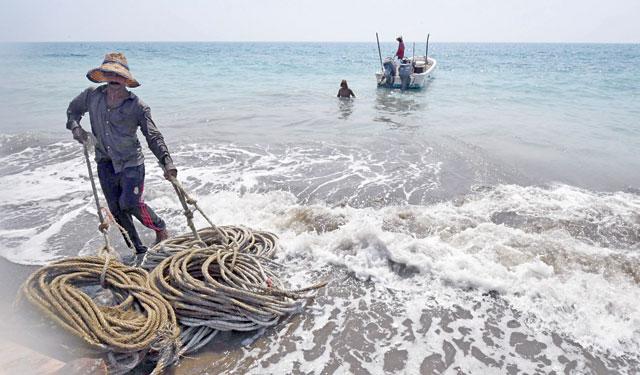You are here
Iran diplomat calls talks with UK minister ‘repetitive’
By AFP - Jun 24,2019 - Last updated at Jun 24,2019
TEHRAN — A top Iranian diplomat expressed disappointment on Sunday after meeting a British Foreign Office minister amid escalating regional tensions, saying their talks were “repetitive”, state news agency IRNA reported.
Minister of State for the Middle East Andrew Murrison had the “usual talking points”, said Kamal Kharazi, the head of the strategic council of foreign relations at Iran’s foreign ministry.
These included talking up a European payment mechanism to help Iran with US sanctions and saying “that Britain has always supported the JCPOA [nuclear deal] and has its own problems with America”, Kharazi added.
“Such talks that have always been repetitive.”
The JCPOA is the Joint Comprehensive Plan of Action, a multilateral 2015 nuclear deal that the US unilaterally withdrew from in May last year.
Washington has since reimposed biting sanctions against the Islamic republic, despite Britain, China, France, Germany and Russia remaining committed to the deal.
Murrison said that in Tehran he had been “clear about the UK’s long-held concerns over Iran’s activities in the region”, according to a Foreign Office statement.
“I reiterated the UK’s assessment that Iran almost certainly bears responsibility for recent attacks on tankers in the Gulf of Oman.”
The minister said he also repeated that Britain was determined “to maintain the nuclear deal which is in our shared security interests”.
“I was clear that Iran must continue to meet its commitments under the deal in full — including the limits imposed on its low-enriched uranium stockpile,” he was quoted as saying.
Murrison also had meetings with Vice President Masoumeh Ebtekar, Deputy Foreign Minister Abbas Araghchi and the deputy head of Iran’s atomic agency, Behrouz Kamalvandi.
Tensions between Washington and Tehran have flared further after Iran on Thursday shot down a US surveillance drone.
Iran said the drone violated its airspace — a claim the US denies —near the strategic Strait of Hormuz.
In response, the US was ready to carry out a military strike against Iran but US President Donald Trump said he had called it off at the last minute.
The downing of the drone came after Iran-US tensions spiked following a series of attacks on commercial vessels that the US has blamed on Iran — accusations vehemently denied by the Islamic republic.
Britain is a signatory to the 2015 nuclear deal which saw Iran scale back its nuclear programme in exchange for sanctions relief.
European powers have tried to respond to the US withdrawal by setting up a special trade mechanism called INSTEX that would allow legitimate trade with Iran to continue without falling foul of US sanctions.
But the mechanism has been dismissed by Iran’s supreme leader Ayatollah Ali Khamenei as a “bitter joke”.
On May 8, Iran said it would reduce some of its nuclear commitments unless the remaining partners helped it circumvent US sanctions and sell its oil.
Iran’s atomic energy agency said on Monday it would soon pass the amount of low-enriched uranium allowed under the nuclear deal.
The deal set a limit on the number of uranium-enriching centrifuges, and restricted Iran’s right to enrich uranium to no higher than 3.67 per cent, well below weapons-grade levels of around 90 per cent.
Kharazi warned Sunday that European powers must realise Iran is “serious” about its decision and that “in two weeks it will take new steps” to scale down nuclear commitments.
Related Articles
TEHRAN — Iran said Monday it has exceeded a limit on its enriched uranium reserves under a 2015 nuclear deal that has edged towards collapse
WASHINGTON — US President Donald Trump warned Monday that Iran is "playing with fire" after Tehran said it exceeded a limit on enriched uran
VIENNA — Iran's nuclear negotiator Abbas Araqchi said on Monday he expected a deal with six world powers on shrinking Tehran's atomic progra














